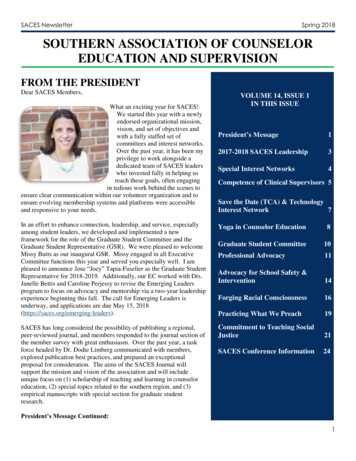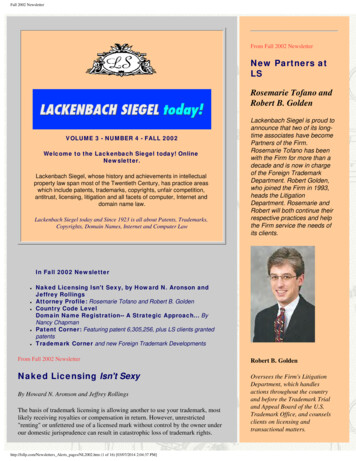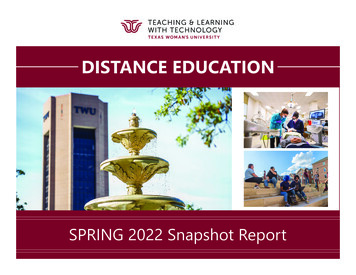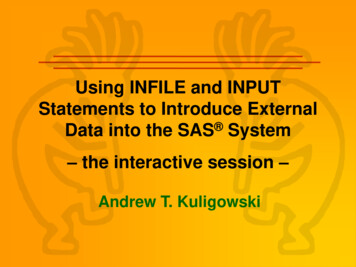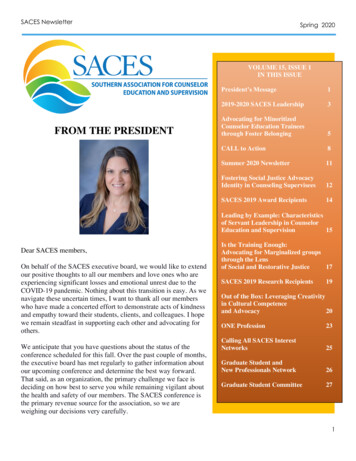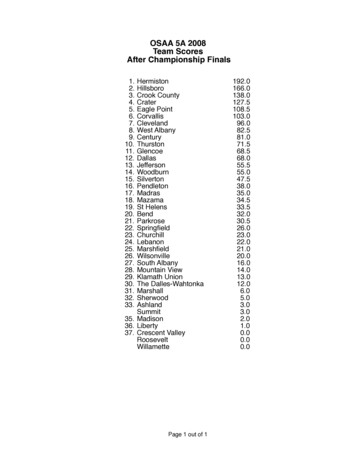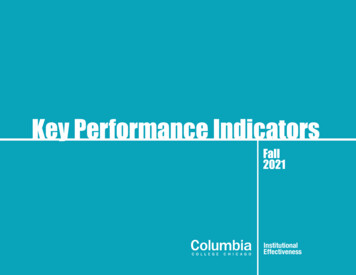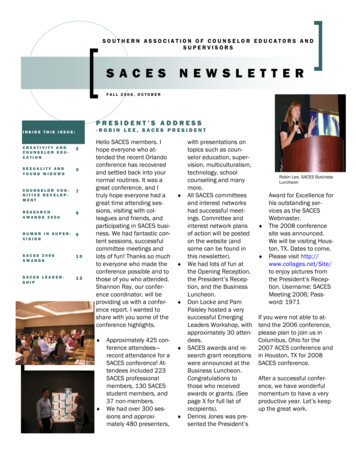
Transcription
SOUTHERN ASSOCIATION OF COUNSELOR EDUCATORS ANDSUPERVISORSSAC E SN E W S L E T T E RFALL 2006, OCTOBERPRESIDENT’S ADDRESS-ROBIN LEE, SACES PRESIDENTINSIDE THIS ISSUE:CREATIVITY ANDCOUNSELOR EDUCATION2SEXUALITY ANDYOUNG WIDOWS3COUNSELOR COGNITIVE DEVELOPMENT7RESEARCHAWARDS 20069HUMOR IN SUPERVISION9SACES 2006AWARDS10SACES LEADERSHIP12Hello SACES members. Ihope everyone who attended the recent Orlandoconference has recoveredand settled back into yournormal routines. It was agreat conference, and Itruly hope everyone had agreat time attending sessions, visiting with colleagues and friends, andparticipating in SACES business. We had fantastic content sessions, successfulcommittee meetings andlots of fun! Thanks so muchto everyone who made theconference possible and tothose of you who attended.Shannon Ray, our conference coordinator, will beproviding us with a conference report. I wanted toshare with you some of theconference highlights. Approximately 425 conference attendees—record attendance for aSACES conference! Attendees included 223SACES professionalmembers, 130 SACESstudent members, and37 non-members. We had over 300 sessions and approximately 480 presenters, with presentations ontopics such as counselor education, supervision, multiculturalism,technology, schoolcounseling and manymore.All SACES committeesand interest networkshad successful meetings. Committee andinterest network plansof action will be postedon the website (andsome can be found inthis newsletter).We had lots of fun atthe Opening Reception,the President’s Reception, and the BusinessLuncheon.Don Locke and PamPaisley hosted a verysuccessful EmergingLeaders Workshop, withapproximately 30 attendees.SACES awards and research grant receptionswere announced at theBusiness Luncheon.Congratulations tothose who receivedawards or grants. (Seepage X for full list ofrecipients).Dennis Jones was presented the President’sRobin Lee, SACES BusinessLuncheonAward for Excellence forhis outstanding services as the SACESWebmaster. The 2008 conferencesite was announced.We will be visiting Houston, TX. Dates to come. Please visit http://www.collages.net/Site/to enjoy pictures fromthe President’s Reception. Username: SACESMeeting 2006; Password: 1971If you were not able to attend the 2006 conference,please plan to join us inColumbus, Ohio for the2007 ACES conference andin Houston, TX for 2008SACES conference.After a successful conference, we have wonderfulmomentum to have a veryproductive year. Let’s keepup the great work.
SACES NEWSLETTERPage 2CREATIVITY AND COUNSELOR EDUCATION: ALOOK AT BEGINNING MASTER’S STUDENTS-ALLISON SMITH, DOCTORAL STUDENTWhen I decided toswitch my undergraduate major from theaterto psychology, and as Icontinued into a master’s program in counseling, friends and family asked me what I’d dowith my love for thearts. For a long time, Istruggled with an answer and hoped that Iwould find a way tosomehow do both. During my master’s trainingprogram, I began to findways to merge my twointerests. This happened without reallytrying since I had previously learned best byusing creativity and experiential techniques. Isoon found that I did itin my master’s programin counseling as well.Although I didn’t haveformal classroom training on creativity andcounseling; I talked toothers and began reading in order to start using it.In my doctoral programin counseling and counselor education, I’vecontinued my interest increative techniques.Recently, I have extended this interest andlooked more specificallyat creativity not only incounseling, but alsowithin counselor educa-tion. Through reading, Ihave learned a few interesting pieces of information regarding counselor training and creativity. First, althoughcreativity is important incounseling, training oncreativity for beginningcounselors is lacking ornonexistent in counselor education programs. Even further,creativity and academiaare oftentimes understood as opposites.Creativity is understoodas something beginningcounseling studentsmight specialize in afterthe student has an understanding of the more“academic” material,such as traditional theories and techniques.In order to begin to seecreativity as somethingfundamental ratherthan a specialty thatone acquires later in acounseling career, creative approaches areneeded at the beginning of counselor training programs—whenmaster’s students arefirst learning theoriesand techniques. Thismay be a curriculumchallenge to counseloreducators who maystruggle to meet thedemands from CACREPor may be apprehensiveabout offering nontraditional courses or material in a counseling program at the master’slevel.But what do master’sstudents report aboutcreativity? IN order toinvestigate the use ofcreativity and counseloreducation training programs, I designed aquestionnaire to address topics regardingbeginning counselorsand creative approaches. Researchquestions examiningmaster’s students useof, and thoughts about,using creativity in counseling were addressedusing a 19-item surveyconsisting of a Likerttype scale ranging from“strongly agree” to“strongly disagree”. Thesample consisted of 27master’s students (24females; 3 males) seeing their first client. Aspart of the practicumexperience, participantssaw their client for 550-minute sessions.Of the 27 participants,13 reported they usedcreativity in one or morecounseling sessionswith their clients. Out ofthe 13 who used creativity, 94% reported thatContinued on page 4“The majority ofstudentsreported theywould have beenmore inclined touse creativity incounseling ifthey had moretraining oncreativetechniques”
Page 3SCHOOL COUNSELING INTEREST NETWORK-JOLIE DAIGLE & CAROL PARKER, CO-CHAIRSSince the meeting atSACES, the SchoolCounseling InterestNetwork has beenbusy. Several webhosting providershave been contactedregarding setting upservices such as chatrooms, messageboards, listservs andmore for the network.We are also workingon the ability to videoconference, thanks toLarry Tyson, Deryl Bailey and Carol Parker.any of these new developments, or in theSchool CounselingInterest Network,please contact JolieDaigle atjdaigle@uga.eduIf you are interestedin helping out withSEXUALITY AND YOUNG WIDOWS: WHATCOUNSELORS SHOULD KNOW-JENNY L. BEASLEY PREFFER, DOCTORAL CANDIDATE & AGATHAPARKS-SAVAGE, ASSISTANT PROFESSORImagine that your nextclient on your schedule isa young woman recentlywidowed. What questionswill you ask? Which issuesdo you prepare yourself tofocus on—grief, guilt, anger, depression, isolation,and.sexuality? Yes, sexuality. Do you feel preparedto take on the topic ofsexuality with your youngwidowed client? Mostcounselors may not.A recent count recordsapproximately 425,000widows in the UnitedStates, between the agesof 15 and 441; however, arecent search of PsycINFO, Sage Publishing,and ATLA databases reveal fewer than sixty articles related to widows.While six of these spotlightyounger widows, they donot address sexuality andinstead discuss functionaland dysfunctional grieving,loneliness, parenting, sup-port systems, educationalhistory, and financial resources2,3,4,5,6,7. Sadly, theonly articles addressingsexuality issues in widows8,9 are from two decades ago and include onlywidows between 40 and80 years old. Consider theimpossibility of generalizing the needs for sexualexpression in postmenopausal octogenarians towards any of the1,600 young women wholost their husbands September 11, 2001 or during the ongoing war in theMiddle East10,11.Despite the gap within theliterature, a young widow’sneed for sexual expressionis a valid concern. In abook by Stephanie Ericsson, Companion throughthe darkness, she describes when she waspregnant with her firstchild when her husbanddied and she kept a jour-nal during the monthsfollowing his death. This isa “must-read” for thoseworking with young widows.Shoemaker12, author ofWidow’s Walk, affirmsthese young women stating, “widowhood robs usof our source of affectionand intimacy causingsexuality to be a concern.you have lots of silent company.” (p. 10).Unfortunately, while we asprofessionals acknowledge that sexuality is infact, “a powerful, pervasive drive”13 (p. 51), theneeds of young widowsoften go unaddressed.Several suggest that theyoung widow often represses her need for sexuality out of desire for social acceptability14, 15. Others feel that asking forhelp in this area isCont’d on page 6“Several suggestthat the young[female] widowoften repressesher need forsexuality out ofa desire forsocialacceptability.”
SACES NEWSLETTERPage 4CREATIVITY AND COUNSELOR EDUCATION CONT’Dthe use of creativitybenefited their client. Inaddition, 94% reportedthat using creativitybenefited themselvesas counselors. Eightynine percent of students would have likedto have more creativesupplies available touse. In addition, 78% ofstudents reported thatthey would feel moreinclined to use creativityif more supplies wereprovided to them fromthe in-house trainingclinic. The majority ofthe students (96%) reported they would havebeen more inclined touse creativity in counseling if they had moretraining on creativetechniques.What I find to be interesting after looking atthese results is the following: participants whoused creativity in counseling sessions reportedthat it benefited boththem as counselors andtheir clients. Thus, inthe opinions of counseling students, creativitywas an effective technique—in more than oneway!Also significant is thefact that counseling students would have feltmore included to usecreativity if supplieswere provided by an in-house training clinic.With more supplies onhand students may begin to continue to incorporate creativity intotheir work. However, thehighest percentage ofstudents reported thattraining on creativetechniques would havemade them feel moreinclined to use them intheir counseling sessions. This suggeststhat training may have agreat impact than simply offering creativesupplies to beginningcounselors to use intheir early work.With this in mind, thequestion becomes howmight counselor education programs integratecreativity into the counseling curriculum?Since CACREP does notrequire a specificcourse on creativity, it isnot absolutely necessary. Could training oncreativity be built into acourse such as counseling theories or techniques? Or should anentire course on creativity be offered at themaster’s level? Futureresearch is needed inorder to investigatecounseling students’opinions regarding howmuch and what kind oftraining on creativitythey would like to have.These questions canonly be answeredthrough further investigation on thetopic.Allison Smith isa doctoral student at theUniversity ofNorth Carolinaat Greensboro.CONGRATULATIONStoGerard Lawsonwho was elected President Elect-ElectandGeorge MacMahonwho was elected SACES Secretary.
Page 5COMMUNITY COUNSELING INTEREST NETWORKUPDATE: DEVELOPING A SHARED VISION-DONNA STARKEY & ED CANNON, CO-CHAIRSThe SACES CommunityCounseling Interest Network met during the conference this year to begin a very important dialogue. The group indicated a desire for theinterest network to bemore than a conferencemeeting and to have realmomentum and continuing activity. With ongoingchallenges to our professional identity as counselors and, more specifically, as communitycounselors, we gatheredto address the state ofcommunity counseling.During this meeting weposted these questions:What is the state of community counseling todayand where does it standin relation to clinical andmental health counseling? Given that a primarycriticism of the overallcounseling profession isthe lack of a united vision or definition that iseasily identified and recognized, how do the divisions within the largerprofession contribute?As counselor educators,we realize that one ofour roles is to train thenext generation of master’s level counselorswho will advocate fortheir profession—but howdo we “practice what wepreach” within the realmof community, clinical,and mental health programs?munity Counseling Interest Network determinedto extend an invitation toall faculty members inThose present began tocommunity counselingexplore where we areprograms to participate intoday as counseling fac- the development of thisulty and supervisors, de- interest network vision.spite philosophical andIdeally, such a visionpractical differences,might be addressed nextand discovered a desire year at ACES through conto develop a unifiedtent sessions from thosevoice. We found thatinterested in communityconsensus may be difficounseling. In keepingcult given the differwith that idea, the memences in degree probers of the SACES Comgrams, conflicting priori- munity Counseling Interties, and variations withest Network agreed tolicensure standards. Ac- submit an ACES Workknowledging the evershop proposal to discussevolving opportunitiesthe state of communityand challenges of ourcounseling within the larprofession, the interestger profession. This pronetwork examining theposal will be in additionrole of the 2008 CACREP to our interest networkstandards in the process meeting.of clarifying the state ofcommunity counselingOverall, the members oftoday.the Community Counseling Interest NetworkThroughout the meeting, would like to see a strongthere was an emphasisvoice for communityon the philosophicalcounseling via counselorroots of communityeducators and supervicounseling, and howsors. As a strong groupthose roots are in conwithin the stronger assocert or conflict with other ciation of SACES, we becounselor educators and lieve we are well posisupervisors in communi- tioned to facilitate thecating a strong identitydevelopment of a unifiedto students, the overallvision for the communityprofession of counseling, counseling aspect of ouras well as the society inprofession.which we practice. Assuch, the SACES Com-“What is thestate ofcommunitycounselingtoday ?”If you would like tocontribute anything tofuture editions of theSACES Newsletter,please contact Kelly L.Wester, 2005-2006SACES Newsletter
SACES NEWSLETTERPage 6SEXUALITY AND YOUNG WIDOWS, CONTINUEDdoomed to failure. Shoemaker12 warns widows to expectthat people “may be reluctant to discuss this personalproblem with you. Or if theydo, you’ll likely hear the oldbromides about taking coldshowers, exercising, praying,and otherwise sublimating byconcentrating on work andactivities.” (p. 10).In some instances, professionals may feel untrained orunprepared to address clients’ sexual dilemmas andtherefore do not assess themor may focus treatment awayfrom this area. A recent studyinvestigates the amount ofquality of training that counseling professionals receivein addressing sexual issues.Ford and Hendricks16 reportthat 75% of participants acknowledge receiving sometraining, but few felt adequately prepared to deal withclients’ sexual concerns. Itappears counselors tend toaddress sexual issues basedon their own personal comfort level and may refer clients elsewhere when theyare uncomfortable with sexual values differing from theirown.Consequently, it seems thedilemma of young widowsrevolves around a continuingidentity as sexual humanbeings and the counselingprofessions’ failure to noticethe needs of a significantpopulation. Whether this disregard stems from a deficiency in research literature,a lack of training, or from aconflict of counselors’ personal values surroundingsexual issues, it appearsthat professional counselorsmay encourage these youngwomen to deny an important part of their humanity.Here are a few things forcounselors to considerwhen working with youngwidows:1. Assessment: Whetherformal or informal, it’sthe cornerstone of earlycounseling sessions asprofessionals seek tohelp clients’ prioritizeissues that are painfulto them. Like psychosocial assessment, takinga brief sexual historyprovides both client andcounselor with openingsto discuss the grief andloss issues surroundingthe death of a sexualpartner.2. Training: Training ingrief and loss issuesmay be helpful, especially when the focus isnot limited to the eldergenerations.3. Supervision: Counselorsthat do not have experience with this population should seek supervision from experiencedcounselors in the community. This would provide for a platform toaddress the counselors’concerns and comfortlevel with discussingwidows’ sexuality.4. Know Yourself: Counselors need to be aware oftheir own biases relatedto discussing the topicof sexuality with theirclients. I was once toldby a counselor that itwas not necessary totake a human sexualitycourse because his clients don’t have “those”types of “issues”. Thisparticular counselorworks with couples.Counselors’ acknowledgement of young widows assexual human beings may bea first step in encouragingresearch that provides thecounseling profession withthe direction necessary toreach this population. Certainly, the need for acceptance and support is vital foryoung widows as they nolonger belong to the marriedworld but are far from joiningthe ranks of the elderly widows with whom we are mostfamiliar.Jenny Beasley Preffer is a doctoral student, and Agatha ParksSavage is an Assistant Professorin the department of CounselorEducation and Supervision atRegent University.References1 U.S. Bureau of the Census. (2000).In PCT7 Sex by marital status by agefor the population 15 years and over(). Retrieved June 1, 2006, fromhttp://factfinder.census.gov/servlet/DTTable? bm y&geo id 01000US&ds name DEC2000 SF3 U&mt name DEC 2000 SF3 U PCT0072 Derman, D. S. (2000). Grief andattachment in young widowhood(Doctoral dissertation, Larcher U,2000). Dissertation Abstracts International, 60(7-A), 2383.3 DiGiulio, J. F. (1992). Early widowhood: An atypical transition. Journalof Mental Health Counseling (Specialissue: Women and Health), 14(1), 97109.4 Guckin, T. M. (2002). Younger womenwhose significant others died and whoare rearing children (Doctoral dissertation, Walden University, 2001). Dissertation Abstracts International, 62(10-B),4786.5 Larman, J. S. (2004). Conjugal bereavement in younger and older widowsand widowers: Influences of health andsocial support (Doctoral dissertation,Fielding Graduate Institute, 2004). Dissertation Abstracts International, 64(8B), 4046.6 Lawrence, L. (1992). 'Till death do uspart': The application of object relationstheory to facilitate mourning in a youngwidows' group. Social Work in HealthCare (Special Issue: A hospital socialwork department's 40th Anniversary), 16(3), 67-81.7 Zonnebelt-Smeenge, S. J., & DeVries,R. C. (2003). The effects of gender andage on grief work associated with griefsupport groups. Illness, Crisis, & Loss,11(3), 226-241.8 Kansky, J. (1986). Sexuality of widows: A study of the sexual practices ofwidows during the first fourteen monthsof bereavement. Journal of Sex & Marital Therapy, 12(4), 307-321.9 Malatesta, V. J., Chambless, D. L., &Pollack, M. (1988). Widowhood, sexuality, and aging: A life span analysis. Journal of Sex & Marital Therapy, 14(1), 4962.10 Brant, M. (2006, April 26). Newsweek National News. In No child leftbehind: More than 1200 kids have lost aparent in Iraq or Afghanistan. How is thePentagon helping them to cope. Retrieved May 27, 2006, from MSNBCWeb Site: /11 New York Magazine. (2006). In 9/11by the numbers: Death, destruction,charity, salvation, war, money, realestate, spouses, babies, and other September 11 statistics. Retrieved May 27,2006, from r/numbers.htm12 Shoemaker, J. W. (1995). Widow'swalk (Rev. ed.). San Luis Obispo, CA:Lodestar Publications.13 Smoke, J. (1999). Single again-theuncertain journey: Hope for widowedand divorced Christians. Ann Arbor, MI:Vine Books.14 Brothers, J. (1990). Widowed. NewYork: Ballantine Books.15 Shibley Hyde, J., & DeLamater, J. D.(2000). Understanding human sexuality(7th ed.). Boston: McGraw Hill.
Page 7COUNSELOR COGNITIVE DEVELOPMENT-LAURA WELFARE, DOCTORAL CANDIDATEClient issuesin counselingare oftencomplex. Effective counselors areable to identify and integrate multiple factors toreach an accurate understanding of complexclient needs. Identifyingand integrating information is a cognitive process. An individual’s cognitive system is comprised of conceptualtemplates can understand varied and intricate experiences; while,individuals with lessdeveloped cognitivesystems understandexperiences more simplistically. Thus, counselors’ cognitive complexity is fundamentalto effective practice.As counselor educatorsand supervisors, westrive to facilitate students’ growth in manyareas. One of these areas is cognitive development, which has longbeen identified as animportant goal of counselor preparation (e.g.,Blocher, 1983). In planning interventions toincrease students’ cognitive complexity, a fewsalient aspects of cogni-tive development mustbe considered.First, cognitive complexity is domain specific.That is, an individualcould have complexconceptualizations ofadolescent boys, butonly a simplistic understanding of divorcedwomen. Similarly, cognitive growth in one areadoes not necessarilystimulate growth in another. To maximize cognitive development students must have learning experiences in multiple domains.Second, exposure aloneis not sufficient forgrowth; the individualmust reflect on the experience to achieve cognitive development.Cognitive developmentbegins when studentsexperience somethingthat does not fit withtheir existing cognitivesystem. Counselor educators and supervisorshelp the student makenew meaning of the experience by exploringthe student’s thoughtsand reactions.Finally, individuals understand their world asbest they can with thecognitive system theyhave in place. Studentsfrequently believe theyunderstand a clientbased on their recognition of some basic characteristics (e.g., unemployed, male, cocaineaddict). The goal is tohelp students realizethat there are additionalfactors to be considered(E.g., enabling family,repressed trauma, lowself-esteem). Since students rarely know whenthey have an incompleteconceptualization of aclient, their self-reportsare insufficient.In sum, to facilitate student cognitive development, students need exposure to varied experiences, the opportunity toprocess those experiences, and an educator,supervisor, or peer toidentify teachable moments.his or her thoughts andfeelings that arise duringa counseling session. Inthis technique, supervisors use open-endedquestions to explore segments of the student’srecorded counseling session. The supervisorplays the role of an inquirer who prompts student self-reflection.The Reflective Process(Goodyear & Nelson,1997) is an extension ofInterpersonal ProcessRecall that encouragescounselors to seek understanding of what occurs in the counselingsession. In this technique, students areasked to reflect on theiremotions, thoughts, andinteractions with the client. The supervisor anchors the reflection in adilemma that arises inone of the student’scounseling sessions.Although the importanceof counselor cognitivecomplexity is clear, onlya few interventions designed to encourage cognitive growth have beendescribed. The followingtechniques are designedfor use in individual orgroup supervision.Interpersonal ProcessRecall (e.g., Kagan,1980) encouragessupervisee awareness ofStructured Peer GroupSupervision (Borders,1991) also encouragescognitive development.Continued on page 9
SACES NEWSLETTERPage 8RESEARCH AND PRACTICE GRANTS AWARD RECIPIENTSTeresa B. Fletcher, North Georgia State UniversityThe scripted prejudice-awareness narrativeDana Griffin, The College of William & MaryInvestigating differences in moral development, multicultural competence andracial identity development in school counselorsHeather Smith, University of Central FloridaThe relationship among wellness, severity of disturbance, and social desirability in entering master’s levelcounseling studentsMelanie Drake Wallace, University of AlabamaNo title submittedJoshua Watson, Mississippi State University—MeridianThe influence of online instruction on the counseling self-efficacy of counselors-intrainingJolie Ziomeck-Daigle, University of GeorgiaCounselor educator’s perceptions of the gate keeping processHUMOR IN COUNSELING SUPERVISION: A FIRST LOOK AND A FEWTHOUGHTS-MIKE SILVA, DOCTORAL CANDIDATEAttempting to provide acomprehensive definition of humor would bean effort wasted. Thesimple fact of the matter is that not only ishumor too broad to explain, but also it variesdramatically from oneperson to another. Inorder to better understand humor and itspotential benefits incounseling supervision,one can start by examining popular theory.Three theories emergefrom the literature thatmay shed light on thiselusive construct: superiority, relief, and incongruity. Each describesthe foundational reasons as to why individuals respond to situations in a humorousmanner.The first, superiority,describes humor as ameans of power. Anything seen as comical isalso seen as inferior. Anexample of this type ofhumor can be observedon a playground whereone child makes fun ofanother for the pur-poses of both elevatingtheir own status, anddevaluing their target.The second, relief, isseen as a way of releasing tension or uncomfortable feelings in asocially acceptableform. An example of thisis incongruity, explainshumor as the recognition of expectations notbeing met. An example
Page 9COUNSELOR COGNITIVE DEVELOPMENT, CONTINUEDDuring a case presentation, each member ofthe group assumes aspecific role and provides feedback fromthat perspective. Thepresenter is exposed tonew ways of thinkingabout the case. The supervisor moderates thediscussion and summarizes the feedback tohelp the student learnfrom the experience.The thinking-aloud approach allows supervisors to model in-themoment cognitive processing (Borders &Brown, 2005). For example, “As I watch yourclient I notice conflictingmessages. She reportsfeeling comfortable atwork; but, when shedescribes the staffmeeting her shoulderstense and she wringsher hands. I am wondering what her body language could mean. Ihave a hunch that heranxiety is not resolvedand I am consideringhow I could addressthat with her.” Thistechnique reveals thesupervisor’s thoughtprocess and modelshow the thoughts drivecounseling interventions.As with much of whatwe do, describing atechnique is almost ascomplicated as using iteffectively. Hopefully,this woefully brief description has peakedyour interest in counselor cognitive development. More completeinformation about thetechniques is availablein the sources cited. Incounselor educationand supervision, wemust make “deliberate,proactive choices” inorder to maximize ourstudents’ growth(Borders & Brown,2005, p. 55). With thedeliberate goal of facilitating student cognitivedevelopment, focusedattention on identifyingteachable moments,and continued researchon cognitive growth wecan become even moreeffective in preparingthe counselors of tomorrow.Laura Welfare is a doctoralcandidate in the departmentof Counseling and Educational Development at University of North Carolina atGreensboro.ReferencesBlocher, D. H. (1983). Toward acognitive developmental approach to counseling supervision. The Counseling Psychologist, 11(1), 27-34.Borders, L. D. (2001). Counseling supervision: A deliberateeducational process. In D. C.Locke, J. E. Myers, & E. L. Herr(Eds.), The handbook of counseling (pp. 417-432). ThousandOaks, CA: Sage.Borders, L. D. (1991). A systematic approach to peer groupsupervision. Journal of Counseling and Development, 69, 248252.Borders, L.D. & Brown, L. L.(2005). The new handbook ofcounseling supervision. Mahwah, NJ: Lawrence ErlbaumAssociates.Goodyear, R. K. & Nelson, M. L.(1997). The major supervisionformats. In C.E. Watkins, Handbook of psychotherapy supervision. New York: John Wiley.Kagan, N. (1980). Influencinghuman interactions—eighteenyears with IPR. In A. K. Hess(ed.) Psychotherapy supervision:Theory, research and practice.New York: John Wiley.Kelly, G. A. (1955). The psychology of personal constructs. NewYork: Norton.“As counseloreducators andsupervisors, westrive tofacilitatestudents’ growthin many areas.One of theseareas iscognitivedevelopment,which has longbeen identifiedas an importantgoal ofcounselorpreparation.”
SACES NEWSLETTERPage 102006 SACES AWARDS RECIPIENTS-GLENN LAMBIE, AWARD SACES COMMITTEE CHAIRPERSONUNIVERSITY OF CENTRAL FLORIDAThe 2006 SACES award recipients were recognized at the fall conference in Orlando, FL. The awards committee received a considerable number of nominations and was able to recognize the achievements of twooutstanding counselor education programs, two exceptional counselor educators, an excellent counseloreducation graduate student, and one innovative state ACES association. The following highlights some ofthe recipients’ achievements.Individual Achievement: Graduate Student—Doctoral LevelAnneliese Singh, Georgia State UniversityMs. Singh has been an outstanding doctoral student who is committed to advocacy and social justice. Additionally, Anneliese has established an impressiverecord of scholarly work, including numerous refereed professional publicationsand presentations.Individual Achievement: Pre-tenured Counselor Educator AwardDr. Kelly L. Wester, University of North Carolina at GreensboroDr. Wester has begun her career as a counselor educator in an exemplary fashion. Shehas established a strong research agenda and been successful in publishing in highlyranked scholarly journals. Further, Dr. Wester has made excellent service contributions tothe counseling profession, including serving on multiple editorial boards and as theSACES newsletter editor.Individual Achievement: Tenured Counselor Educator AwardDr. Susan R. Furr, University of North Carolina at CharlotteDr. Furr has established herself as a leader in counselor education and supervision. She currently serves as department chair and has established a strong lineof research. Additionally, Dr. Furr has mentored many doctoral students and junior faculty, while consistently supporting the couns
teresting pieces of infor-mation regarding coun-selor training and crea-tivity. First, although creativity is important in counseling, training on creativity for beginning counselors is lacking or nonexistent in coun-selor education pro-grams. Even further, creativity and academia are oftentimes under-stood as opposites. Creativity is understood


